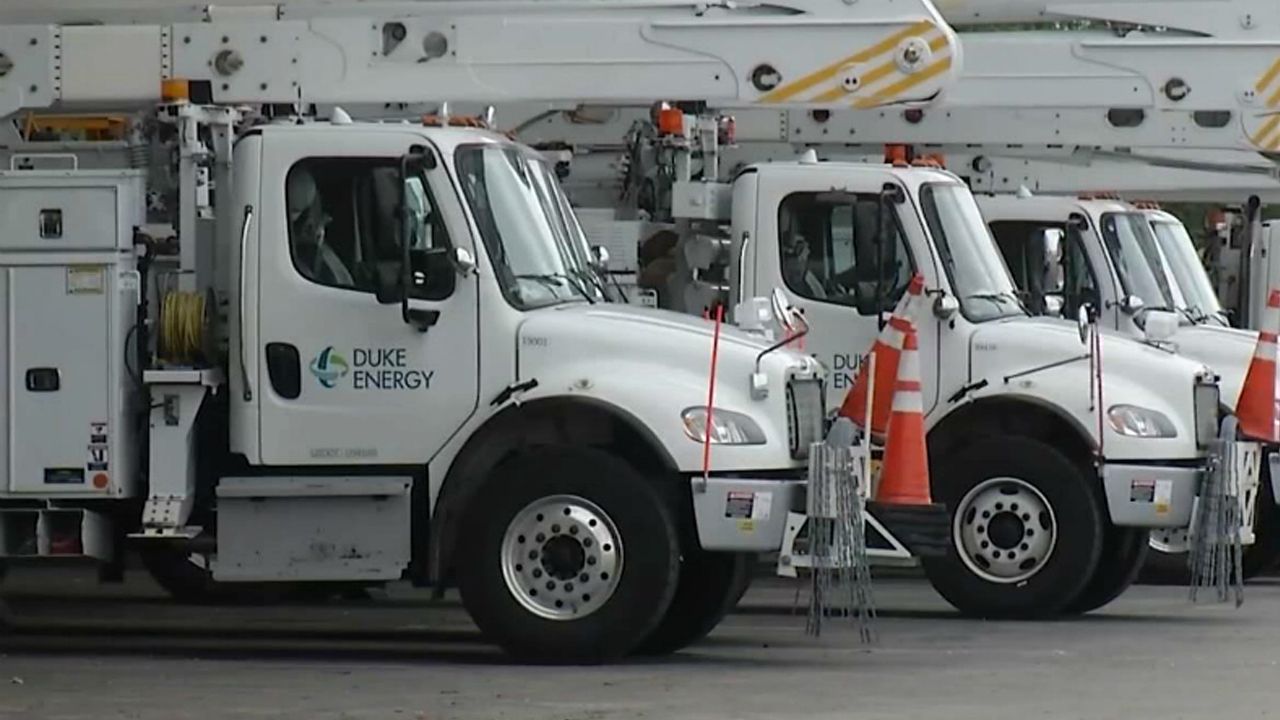CHARLOTTE, N.C. — Crews have been working all day to make repairs following the winter storm that left icy conditions, downed trees, and glazed over power lines in its wake.
Just a few hundred outages remain across the state, according to the Duke Energy outage map.
Your Local Forecast
Current Power Outages
Ahead of the storm Wednesday, Duke Energy said they were making preparations for the winter weather and encouraged residents and customers to do the same.
The company projected nearly 1 million power outages could result from the storm’s potentially hazardous wintry precipitation and high-winds.
In preparation, Duke Energy says it had “thousands of employees supporting the company’s response, including 5,400 line technicians and vegetation workers.”
Prior to the storm, workers checked equipment, supplies, and inventories to ensure crews have enough materials to make the necessary repairs and restore any lost power. An aerial inspection of all transmission lines located in areas expected to be hardest hit have also been completed, officials say.
Once the storm passed, Duke Energy says crews began assessing the extent of any damage, which can take around 24 hours. While these assessments are underway in some areas, other crews also began working simultaneously to restore power.
The company says it can begin providing estimated restoration times once the assessments are complete. Regular updates will be provided to customers and communities via email, text message, outbound phone calls, social media, and the Duke Energy website.
To help you prepare, Duke Energy has released the following tips and information regarding preparation, safety, reporting outages, and more.
Customers should prepare
Duke Energy urges customers to have a plan in place now, in the event they experience an extended power outage.
With temperatures forecasted to be below freezing Friday and Saturday in many areas of both states, customers should consider alternative locations for family members who are elderly or who have special medical needs, if outages are extended.
When checking on neighbors and friends, be sure to follow social distancing recommendations, local orders and restrictions, and other CDC recommendations to protect yourself and others.
Tips to help you and your family stay safe
- Create (or update) an emergency supply kit to save valuable time later. The kit should include everything an individual or family would need for at least two weeks, especially medicines, water, non-perishable foods, blankets, travel bags and other supplies that might be hard to find after a storm strikes. Your emergency kit should also include items that can help protect you and others from COVID-19, such as hand sanitizer, bar or liquid soap, and face coverings aligned with CDC guidance.
- Keep a portable radio or TV, or NOAA weather radio on hand to monitor weather forecasts and important information from state and local officials.
- Charge cellphones, computers and other electronic devices in advance of storms to stay connected to important safety and response information. Consider purchasing portable chargers and make sure they are fully charged as well.
- Stay away from power lines that have fallen or are sagging. Consider all lines energized as well as trees or limbs in contact with lines. Please report downed power lines to Duke Energy.
- If a power line falls across a car that you're in, stay in the car. If you MUST get out of the car due to a fire or other immediate life-threatening situation, do your best to jump clear of the car and land on both feet. Be sure that no part of your body is touching the car when your feet touch the ground.
- If you use a generator due to a power outage, follow the manufacturer's instructions to ensure safe and proper operation. Operate your generator outside. Never operate it inside a building or garage.
Reporting outages and receiving updates
Before a storm hits, customers can sign up to receive outage alerts, and ensure contact information is current and communication preferences specified. Throughout the storm, the company will also provide updates to customers via email, phone, text and the website.
Customers who experience a power outage can report it the following ways:
- Visit duke-energy.com on a desktop computer or mobile device.
- Use the Duke Energy mobile app – download the Duke Energy App from a smartphone via Apple Store or Google Play.
- Text OUT to 57801 (standard text and data charges may apply).
- Call Duke Energy’s automated outage-reporting system:
- Duke Energy Carolinas: 1-800-POWERON (1-800-769-3766)
- Duke Energy Progress: 800.419.6356
Lake Levels
Heavy rainfall will result in higher lake and river levels across the Catawba River basin. Duke Energy is moving water through the river system, including moving water through our hydro generating units and flood gates.
Lake residents should prepare for possible flooding conditions and closely monitor lake levels. High water conditions can create navigational hazards.
The company urges people living along lakes and rivers, and in flood-prone areas, to use caution, follow directions from emergency management officials, pay close attention to changing weather and stream-flow conditions, and stay informed.
We are posting real-time updates on:
- Duke Energy’s webpage
- Duke Energy’s lake services phone line: 800.829.5253
- Duke Energy’s free Lake View app (downloadable from your cell phone app store)
Duke Energy also will provide updates on its Twitter and Facebook pages to keep customers informed if significant outages occur.



